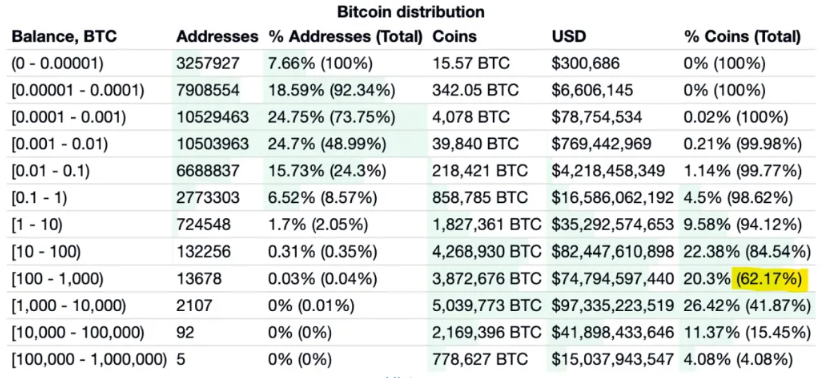According to data provided by BitInfoCharts, @GRomePow shared a post on December 4th stating that only 0.04% of Bitcoin (BTC) addresses control 62% of the supply in circulation, which is over 19.5 million according to 21milyon.com.
Current State of Bitcoin Holders
The distribution in cryptocurrencies has reignited debates about Bitcoin’s decentralization. Economy critics are fueling discussions on whether it fulfills the promise of a democratized financial system. The mysterious creator of the first blockchain, Satoshi Nakamoto, aimed to introduce P2P electronic cash with an autonomous system, with its biggest feature being decentralization.
However, based on research by @GRomePow, BitInfochart presents a growing gap between a small group known as whales, who own large amounts of BTC, and the majority of individual investors who have much smaller investments. The addresses with the largest accumulations hold 62% of the current circulating supply. Most BTC owners have very small investment amounts.

This distribution inequality has led some critics to claim that Bitcoin’s wealth distribution is no different from traditional financial systems and weakens the claim of decentralization. Although this is seen as an increasing concern in the crypto market, Bitcoin advocates argue that the distribution of cryptocurrencies and decentralization are two different concepts.
They point out that investors holding BTC have nothing to do with securing or validating the network. Such companies could be MicroStrategy and Tesla, which have accumulated billions of dollars in BTC over the years and hold them as part of their investment strategies.
What Causes the Inequality in BTC Distribution?
In general, the wealth distribution in Bitcoin is associated with early buyers who acquired significant amounts of BTC in the initial phase. As cryptocurrencies rose much faster than traditional economic investment tools, these initial investors accumulated considerable wealth.
It is indicated that following all this process, Nakamoto alone controls 1 million BTC. Meanwhile, early miners like Hal Finney’s legacy and those who adopted it control billions of dollars worth of cryptocurrency mined using their desktop computers.
Furthermore, unlike traditional economies, Bitcoin’s decentralized structure provides individuals the opportunity to choose how to manage their assets. Some keep their BTCs in wallets as a security measure, while others hold them on exchanges for easier trading.









